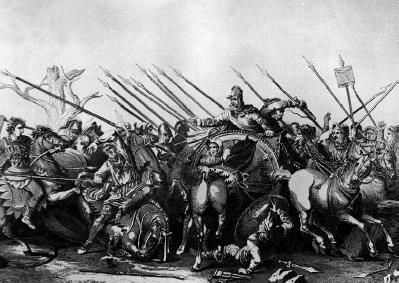War and ConflictPan-Hellenism |
Why was Macedonian king Alexander known as “the Great”? |
The Macedonian king Alexander the Great (356–323 B.C.) has passed through history as a legendary figure, a reputation attributable to the fact that he conquered virtually all of the known world in his day. In effect, he was king of the world, though his tenure in that role was relatively brief.
Born in the Greek city-state of Macedonia, Alexander was the son of King Philip II (382–336 B.C.), who had risen to power three years earlier. He had an upbringing and education befitting a young Greek prince: Alexander was tutored by Greek philosopher Aristotle (384–322 B.C.) and was trained in athletics and war. His studies of Greek literature and art would later combine with his skill as a warrior to produce a formidable conqueror: Inspired by Greek culture, he also possessed the military prowess and cunning necessary to spread Hellenism (Greek culture) throughout the known world.
At the age of 16, Alexander began running the government of Macedonia while his father, King Philip, waged military campaigns to protect and expand his kingdom. At the age of 17, Alexander joined his father on the battlefield, where he commanded a section of the army to defeat Thebes. When Philip was assassinated in 336 B.C., Alexander acted quickly to assert his claim to the throne. Having done so by 335 B.C., he continued to carry out his father’s campaigns, securing Greece and the Balkan Peninsula by the fall of that year. He followed this with an all-out offensive on the Persian Empire, long the enemy of Greece. Supremely courageous and confident in his own abilities as well as in his troops (which numbered in the tens of thousands), by the fall of 331 B.C. Alexander had defeated the Persian army and along the way claimed Egypt. The centuries-old Persian Empire crumbled, and the young Macedonian king proclaimed himself “Lord of Asia.” Still, he pressed on, claiming Afghanistan (where he solidified his claim by marrying a young princess) and then India. He was poised to take the Arabian peninsula in 324 B.C. when he died of fever. He was 33. His vast kingdom, which he had ruled leniently but nevertheless authoritatively, was divided among his former generals.

